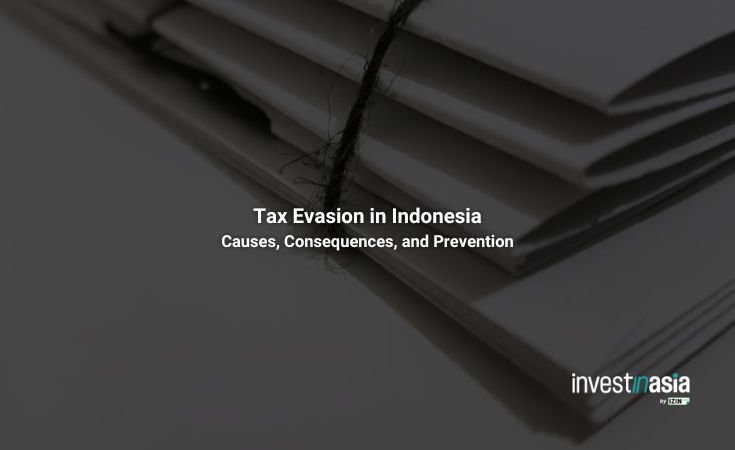Tax evasion remains a significant challenge in Indonesia, impacting government revenue and economic stability. While businesses and individuals are required to comply with tax regulations, some engage in illegal practices to minimize their tax liabilities. The Indonesian government continues to strengthen its tax enforcement efforts, including implementing a digital tax system to curb fraudulent activities.
This article explores tax evasion in Indonesia, how it differs from tax avoidance, and the penalties involved.
Also read: Understanding Indonesia’s Tax Bracket System (Latest Update)
What is Tax Evasion?


Tax evasion in Indonesia refers to illegal actions taken by individuals or businesses to avoid paying taxes. These actions include underreporting income, overstating deductions, issuing fake invoices, or failing to report income altogether. Unlike tax avoidance, which involves legally minimizing tax liabilities through loopholes, tax evasion is a criminal offense under Indonesian law.
Difference Between Tax Evasion and Tax Avoidance
Tax evasion and tax avoidance are often mistaken as the same thing, but they have fundamental differences. Tax evasion involves illegal actions such as falsifying financial records, underreporting income, or using fake invoices to evade taxes. These activities violate tax laws and result in severe penalties. On the other hand, tax avoidance refers to using legal loopholes or strategic planning to minimize tax obligations within the boundaries of the law.
While tax avoidance is legal, excessive use of loopholes can lead to stricter regulations. Understanding these distinctions is crucial for taxpayers to ensure compliance and avoid legal consequences.
Also read: Tax Avoidance in Indonesia: What Foreigners Need to Know
Causes of Tax Evasion in Indonesia
Several factors contribute to tax evasion in Indonesia:
From the Taxpayer’s Perspective:
- Low Tax Awareness – Many taxpayers see taxes as a financial burden and distrust the government’s use of tax revenue.
- High Compliance Costs – The cost of tax compliance, including administrative burdens and payment obligations, discourages some taxpayers from fulfilling their responsibilities.
From the Government’s Perspective:
- Weak Tax Enforcement – The inability to detect tax violations early allows some taxpayers to evade taxes without immediate consequences.
- Frequent Policy Changes – Inconsistent tax regulations make compliance confusing, leading some businesses to engage in tax evasion.
Consequences of Tax Evasion
Tax evasion is a serious offense in Indonesia, carrying penalties under the General Taxation Provisions and Procedures Law (UU KUP 2000). Key consequences include:
- Fines and Penalty Sanctions – Taxpayers caught evading taxes may face significant fines.
- Tax Audit and Investigation – The Directorate General of Taxes (DJP) conducts audits to uncover irregularities in tax reports.
- Criminal Charges – Severe cases, such as issuing fake invoices or non-reporting of income, may lead to imprisonment.
Also read: Withholding Tax in Indonesia: Complete Guide for Foreigners
Government Efforts to Prevent Tax Evasion


The Indonesian government has implemented several measures to curb tax evasion:
Tax Audits and Law Enforcement
Regular audits help authorities detect inconsistencies in financial reports. Stricter legal enforcement, including penalties and criminal charges, discourages fraudulent activities.
Digital Tax System: Coretax
The CoreTax Administration System, set to launch on January 1, 2025, aims to modernize Indonesia’s tax administration. This system:
- Integrates taxpayer data with third-party sources, enhancing transparency.
- Provides real-time access to financial transactions, reducing opportunities for fraud.
- Streamlines tax compliance with a user-friendly digital interface.
Also read: Indonesia’s CoreTax System: A Digital Transformation in Tax Administration
Improved Administrative Procedures
Stronger tax registration, reporting, and collection processes ensure that taxpayers fulfill their obligations efficiently.
Tax evasion remains a major challenge in Indonesia, impacting national revenue and economic stability. The government is strengthening tax compliance through audits, legal enforcement, and technological advancements like Coretax DJP. Taxpayers are encouraged to comply with regulations to avoid penalties and support Indonesia’s economic development.
If you need help with tax management in Indonesia, you can consult with InvestinAsia’s Indonesia tax consultant and compliance services.
Our experienced team of professionals is ready to assist you in every tax matter, such as:
- Accounting and tax reporting services in Indonesia
- Indonesia Payroll Service
- Indonesia LKPM Reporting Service
- Indonesia VAT Taxpayers Registration
Contact us now for FREE consultation and special package!
sources:



